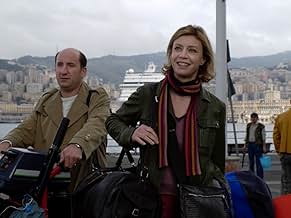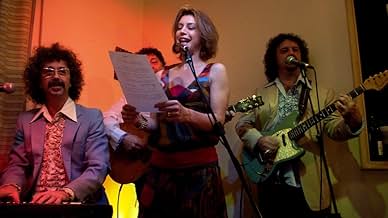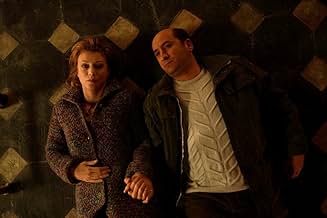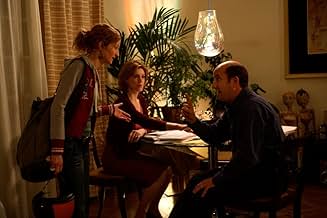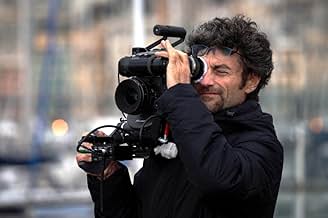IMDb RATING
6.9/10
1.8K
YOUR RATING
A well-off and sophisticated couple struggles to stay together after the husband loses his job.A well-off and sophisticated couple struggles to stay together after the husband loses his job.A well-off and sophisticated couple struggles to stay together after the husband loses his job.
- Awards
- 6 wins & 35 nominations
Storyline
Did you know
- TriviaOrietta Notari's debut.
- SoundtracksSono Tremendo
Written by Giosy Capuano (as G.Capuano), Mario Capuano (as M.Capuano) and Danilo Ciotti (as A.D.Ciotti)
© Edizioni Chappell, S.r.l. / Fonit Cetra Music Publishing, S.r.l.
Performed by Pivio & Tuscolano Brothers
Courtesy of Warner-Chappell Music (Italiana), S.r.l.
Featured review
Times are tough right now, mirroring the era of The Great Depression. Financial security is a ghost, friendships and relationships are tested by walking the razor edge of insolvency, and according to the 'popular movie' polls the escape for many is in the darkened movie houses with comic hero or animal animated mindless safety net entertainment. Not so with the very brilliant film DAYS AND CLOUDS written (with Doriana Leondeff, Francesco Piccolo, and Federica Pontremoli) and directed with immaculate attention to detail by Silvio Soldini (BREAD AND TULIPS, etc). Soldini recreates the global financial nightmare in the form of an examination of one family's fracture and consequences. It resonates despite the depressing story, offering a glimpse into the universal ties that bind us at this moment.
Elsa (Margherita Buy) is graduating from Art History and Restoration school and seems to be a woman on top of her league, complete with surprise gifts and a celebration staged by her husband Michele (Antonio Albanese). Waking up the morning after her congratulations party, Elsa is ill with a hangover, but even more shocked when Michele breaks the news to her that he has been out of work for two months, ashamed that he has lost his company and his job, hiding in the couple's boat during the day. There is no money left and the couple must face losing their home and are forced to take on menial tasks to survive. Pride prevents the couple from sharing their financial downfall with friends and with their one child - Alice (Alba Rohrwacher) who has elected not to pursue education in favor of waiting tables in a restaurant she has invested in with friends. The tension of keeping the secret to themselves causes mounting friction between the couple and events that would have never happened had they shared their misfortune with friends and family bring their relationship to a near fatal end. How they survive is touched, quietly and quickly and gently, at film's end.
Soldini spares no pain in the responses of his characters' misfortune, but at the same time he allows each character to emerge from ideal married tropes to completely human victims of financial ruin. Buy and Albanese are triumphant in their performances as the married couple caught in the crumble of decline. But there are fine performances by Rohrwacher and Fabio Troiano as her lover Riki, and Carla Signoris as Elsa's closest friend Nadia, and actors playing two ex-employees of Michele who provide a window of friendship in Michele's time of desperate need.
The cinematography by Ramiro Cirita and the musical score blending opera and folk music by Giovanni Venosta enhance the motion of the film that though just under two hours in length, appears more succinct. Silvio Soldini has taken a topic that affects us all and polished into a film that is bound to touch every viewer deeply. Highly recommended movie from The Film Movement. Grady Harp
Elsa (Margherita Buy) is graduating from Art History and Restoration school and seems to be a woman on top of her league, complete with surprise gifts and a celebration staged by her husband Michele (Antonio Albanese). Waking up the morning after her congratulations party, Elsa is ill with a hangover, but even more shocked when Michele breaks the news to her that he has been out of work for two months, ashamed that he has lost his company and his job, hiding in the couple's boat during the day. There is no money left and the couple must face losing their home and are forced to take on menial tasks to survive. Pride prevents the couple from sharing their financial downfall with friends and with their one child - Alice (Alba Rohrwacher) who has elected not to pursue education in favor of waiting tables in a restaurant she has invested in with friends. The tension of keeping the secret to themselves causes mounting friction between the couple and events that would have never happened had they shared their misfortune with friends and family bring their relationship to a near fatal end. How they survive is touched, quietly and quickly and gently, at film's end.
Soldini spares no pain in the responses of his characters' misfortune, but at the same time he allows each character to emerge from ideal married tropes to completely human victims of financial ruin. Buy and Albanese are triumphant in their performances as the married couple caught in the crumble of decline. But there are fine performances by Rohrwacher and Fabio Troiano as her lover Riki, and Carla Signoris as Elsa's closest friend Nadia, and actors playing two ex-employees of Michele who provide a window of friendship in Michele's time of desperate need.
The cinematography by Ramiro Cirita and the musical score blending opera and folk music by Giovanni Venosta enhance the motion of the film that though just under two hours in length, appears more succinct. Silvio Soldini has taken a topic that affects us all and polished into a film that is bound to touch every viewer deeply. Highly recommended movie from The Film Movement. Grady Harp
Details
Box office
- Budget
- €300,000 (estimated)
- Gross US & Canada
- $112,102
- Opening weekend US & Canada
- $16,707
- Jul 13, 2008
- Gross worldwide
- $6,966,224
- Runtime1 hour 58 minutes
- Color
- Sound mix
- Aspect ratio
- 1.85 : 1
Contribute to this page
Suggest an edit or add missing content



